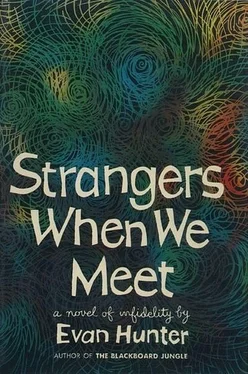“Hi,” Hank called back.
Gently, he loosened Linda’s hand from his sleeve and captured it with his own.
On Thursday night, in the darkness of the parked automobile, Larry sat and waited.
He was grateful for the darkness. He did not want to be seen in town when he was supposed to be in New York. In the light of the dash, his watch read 8:15 and he wondered for the fifteenth time since eight o’clock whether she would come. He had never liked waiting. She should have realized it would be painful for him. She certainly could have shown the consideration of being on time.
If , of course, she were coming at all.
What am I doing here, anyway? he asked himself. Am I crazy? Why did I lie to Eve? This girl means nothing to me. She’s stupid and cheap and she’s probably been had by a thousand men. What do I want from her?
He admitted to himself what he wanted from her.
Not sparkling conversation, not a charming dinner companion, not a twinkle-toed dancing partner. He knew exactly what he desired. Knowing it, admitting it, the lying had seemed essential.
But it disturbed him, and not because it hurt Eve, who had accepted the falsehood with faithful innocence. It was her very trust, instead, which had turned his deception into a barbed shaft that twisted in his chest. He had been untruthful before, but never with Eve. And those lies had never been outrageously false; they had been only the polite inaccuracies of society, small falsehoods that oiled the machinery of American culture, designed to promote harmony, almost merciful in character.
The untruth he told Eve was a bald-faced, monstrous lie invented for deception alone.
“I have to see Altar in the city tonight,” he’d said.
Delivered and accepted, deceit its avowed reason for existence, the lie assumed a life of its own; and it was then that he began working for it rather than it working for him.
With David in for his afternoon nap, Eve left the house to do some shopping. He watched her drive away, debating again in his mind the big question of whether or not he should keep the date with Margaret Gault. Then he thought of the lie.
And it occurred to him that, should the water tank develop a leak, or should Eve suddenly discover she was pregnant, or should any of ten or a hundred or a thousand things happen, Eve might try to contact him at Altar’s. Altar’s number was listed in their personal telephone directory, and he did not feel he knew Altar well enough to beg an alibi. The deception, nonetheless, had to be protected.
He went into the bedroom and found the black book next to the telephone. He looked up Altar’s number. The last digit of the number was a 5. Painstakingly, as diligently as a forger working on a check, he inked over the 5, changing it to a 6. The first part of protecting the falsehood was completed. If Eve called Altar, she would get a wrong number.
But she would then, logically, go to the Manhattan directory to check the number. Larry picked up the bulky phone book and leafed through the A’s, fully intending to rip out the page bearing Altar’s name and number. He discovered, to his relief, that Altar was not listed in the directory. But if Eve really wanted to reach him, she would carry the phoning to its ultimate conclusion, and so Larry could not leave it at that.
He dialed Information and asked for Roger Altar’s listing. The operator told him it was an unpublished number which she could not divulge. He told her it was an emergency, but she remained adamant. Satisfied that Eve could not expose him by calling Altar, he hung up. In a curious way, he was pleased that he was protecting Eve. At the same time, he could not elude the enormity of his deception or the knowledge that his mind was adjusting to it and elaborating upon it.
He felt, too, a tremendous waste of energy.
He had just spent twenty minutes of extreme concentration in an effort to protect his lie. He knew that more energy would be expended in concocting a fiction about what had transpired at Altar’s apartment. Eve would certainly want to know what Altar said and did. He would have to fabricate a conversation and then relate it as if it had actually taken place. He felt suddenly delighted that he had chosen Altar. He could now invent the most fantastic architectural philosophy and pretend that Altar had spouted it. From what Eve knew about the writer, she would accept the most absurd statements as originating in his mind. But again, though he was pleased with the precautions he seemed automatically to take, he felt guilty about the facility and rapidity of his mental adjustment to deceit.
When he drove away from the house that night, the guilt was still strong within him. In a way, it served as a reagent to the fear he might have felt. Tonight he was not frightened. He pulled out of the driveway with strange determination. And though his mind toyed with the idea of meeting her and saying, “Look, Maggie, let’s forget all this. There’s not much sense to it, and I feel guilty as hell,” the idea was rejected immediately upon invention.
Sitting in the parked automobile, he knew he had come this far and could not now retreat. There was a need deep inside him, and he told himself it was a need for the body of Margaret Gault, and for the time being that explanation satisfied him.
A car came up the street.
Its headlights illuminated the interior of the Dodge, and Larry automatically brought his left hand to his face, shielding it. As the car passed, he saw it was a pale-blue Chevy. He followed it in the rear-view mirror. The Chevy pulled up a little past the post office. The motor died. He counted the seconds. The front door opened and he saw her get out of the car and lock it. He instantly turned the key in the ignition and started the engine.
She waited until the light traffic permitted her to cross the street and then, without hesitation, walked directly to the Dodge. He had reasoned that the two most dangerous moments of tonight’s meeting would be those when she entered and left his automobile. For these were the moments of assignation and departure and each would — if observed — be almost impossible to explain. Nervously, he awaited her approach, hearing the clatter of her heels against the sidewalk.
She wore a kerchief, which hid the blonde hair, and he was grateful for her precaution. She paused for a moment before opening the door, as if uncertain this was the right car. Then she reached for the handle and the interior lights snapped on when she opened the door, and she seemed startled by the sudden illumination. She sat quickly, pulling the door shut behind her. The lights went out. There was darkness and silence.
“Hi,” he said.
She smiled uneasily. “Hi.”
He had already flicked on his headlights and pulled away from the curb. “I didn’t think you were coming,” he said.
“I said I would. Could we get away from town quickly, please?”
Her tone worried him. As with the last time she was in the car, there was a stiff nervousness about her, an anxiety around her mouth, an alert darting of her brown eyes. He fought to keep her panic from spreading to him. Someone had to keep a level head and obviously it wasn’t going to be she. “Did you have any trouble?” he asked.
“No. Don gave me the car, but I had to drop him off. Can’t you drive faster?”
“I’d hate to get a speeding ticket,” he said. “It might be a little difficult to explain.”
She nodded. “Where are we going?”
“I thought we’d head north.”
“All right.” She paused. “Suppose someone sees us?”
“Who’s going to see us?”
“I don’t know. One of the neighbors.”
“This is Thursday night, shopping night. They’re all up at the center.”
Читать дальше












